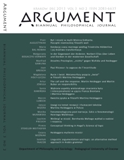Heideggera myślenie nicości
Heidegger's thinking of nothingness
Author(s): Cezary WoźniakSubject(s): Philosophy
Published by: Wydawnictwo Uniwersytetu Komisji Edukacji Narodowej w Krakowie
Keywords: Heidegger; nothingness; nihil originarium; being; time; ecstatic time; temporalisation; fourdimensional time; endowing
Summary/Abstract: This paper tries to grasp the wholeness of Heidegger’s thinking of nothingness. In Being and time Heidegger discovers deeper, more fundamental dimensions of existence, among other things, experience of nothingness. In What is metaphysics? Heidegger takes the question of nothingness, opposing its negative understanding in metaphysics. Nothingness is a condition that enables disclosure of beings as such to human beings (Dasein). In general, Heidegger discovers that nothingness belongs to being (Sein), which expresses his late formula: Being: Nothingness: The Same. The question of being is closely bound with the question of time, hence Heidegger’s thinking of nothingness is involved in his reflection on temporalisation. Temporalisation is the free oscillation of primordial temporality as the open horizon which enables worlding (Welten), or entering into world of beings. Therefore, it is called by Heidegger the nihil originarium (The metaphysical foundations of logic). The world is nothingness which temporalises itself primordially, that which arises in and with temporalisation, which late Heidegger (Time and being) also understands as four-dimensional time. Nothingness is also elaborated on by Heidegger in Contributions to philosophy where he described it as the essential vibration (Erzitterung) of Being (Seyn). During a seminar in Le Thor (1969), Heidegger said that in endowing (Ereignis) there was no Greek thinking. Endowing is not what ‘there is’, but what ‘gives’, ‘endows’ time and being. Being could be understood as presence, however, not a metaphysically understood presence. This presence is not a negative nothingness, but nothingness as nihil originarium, which should be understood rather in a temporal, even energetic meaning and not in an ontological one. However, one can also affirm that nothingness explicated in such manner finally seems to fade away in endowing, this last Heidegger word.
Journal: ARGUMENT: Biannual Philosophical Journal
- Issue Year: III/2013
- Issue No: 2
- Page Range: 301-3012
- Page Count: 11
- Language: Polish

